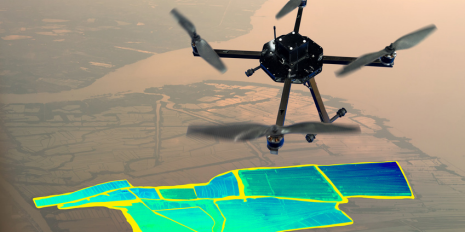Disruptive forces in the food system

Digitalisation is drastically changing the agro-food sector. Though this is not the first time that we face technological disruption, the speed and scale of change is greater than ever before. How can we move forward responsibly?
Self-driving tractors, drones flying over fields, autonomous refrigerators ordering the groceries, robots cooking our meals. These are some examples of every day news about technologies that promise to revolutionise the way we approach food (see also this post by Achim Walter). Although we may still have some years before these technologies reach our doorstep, or our refrigerator, digitalisation is without a doubt changing the way we live.
Digital agriculture and fear of change
At times of technological revolution, fear of change is not new. In fact, it is astonishing how current apprehensions about digitalisation resemble the past: information overload due to the invention of radio and later of television; unemployment caused by the rise of industrial robots in the 1970s and 1980s. When it comes to digitalization in the agro-food sector, things are not that different. The disruption in the whole value chain is unavoidable, but the consequences are still unknown, generating unease among its stakeholders.
However, fear or even denial of the inevitable are bad advisors. Disruption in itself is neither positive nor negative, in the same way that change per se is not. It is the direction we drive change that makes the difference. The question is not whether digitalisation will change the world as we know it; the question is whether we want to be spectators of this change or we want to be part of it. It is here where education and collaborative initiatives play a fundamental role. As part of the academic world, we have the responsibility to prepare our students to be drivers of change and provide the necessary tools to help them navigate successfully through the waves of digitalisation that our generation started.
A need for collaboration beyond technology
Topics such as the introduction of new technologies at different stages of the food value chain and the integration of the data generated are usually at the centre of the discussion about digitalisation of the agro-food sector. However, we tend to forget that our ability to integrate and analyse this information, therefore adding value to it, depends not only on the technical compatibility of different data sources, but also on our capacity and will to work together.
Tackling the challenges of digitalisation at any point of the food value chain will depend not only on the technology, but also on our ability to understand the real needs of farmers, food companies – both big and small – and of course, the consumers. There is immense potential, but also a lot to prove. It will require demonstrating how the use of technical advances can improve not only processes and logistics, but also the quality of life of all stakeholders. Trust has to be built and reliability has to be shown.
What's on stakeholders' minds
This collaborative mind-set was at the centre of the workshop "Challenges of Digitalization in the AgroFood Sector", organised recently by ETH Studio AgroFood and Swiss Food Research. The event was a great opportunity to appreciate the vision from different organisations in Switzerland about digitalisation and sow the seeds for future joint projects. As expected, data security was placed at the top of priority topics for Switzerland, followed by traceability, data analysis and digital skills in general. There was an overall sense of urgency on each topic, which is probably the right mind-set, as technology advances at an exponential rate, whereas humans move inherently at a linear pace.
Risks to be dealt with
If there is something we've learnt from news such as the recent crash of the computer system in Heathrow Airport or the numerous hacks, is that along with the benefits of digitalisation, there are risks that must be identified and dealt with. More than ever, we need to address not only the potential, but also the vulnerabilities associated with our increased dependency on digitalisation and discuss its effects on resilience of the whole food value chain. There is a lot to do on these and other topics and we need to move faster.
After seeing some of the Swiss initiatives being developed on the topic of digitalisation and the feedback received during the workshop, I am even more convinced that there is not only great potential in terms of innovation and technology, but also regarding the motivation and skills to bring the agro-food sector forward in a collaborative and responsible manner.
Thanks to digitalisation, we have the unprecedented opportunity to embrace complexity and challenges of the Food System as a whole. The invitation is to conquer the fear of change by taking an active and informed role in the redefinition of the foundations of our approach to food for the years to come.
Provided by ETH Zurich




















